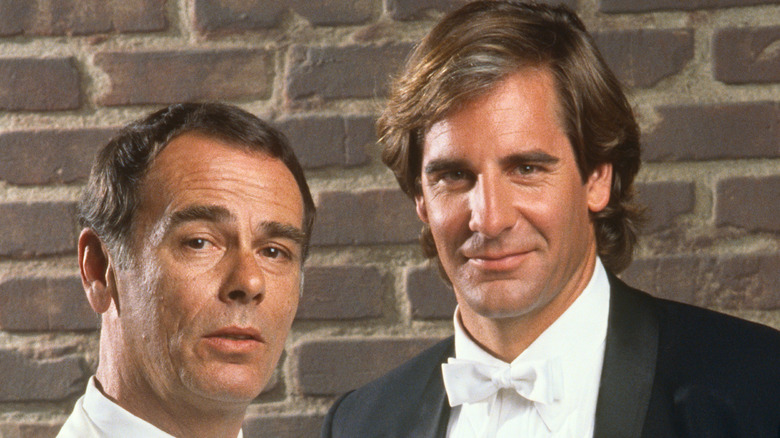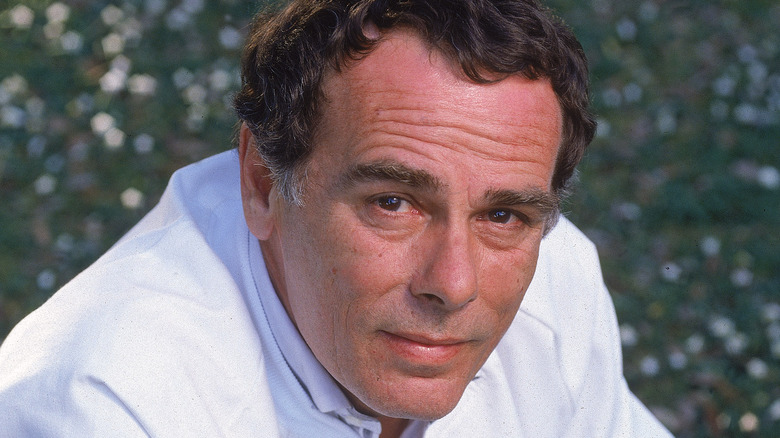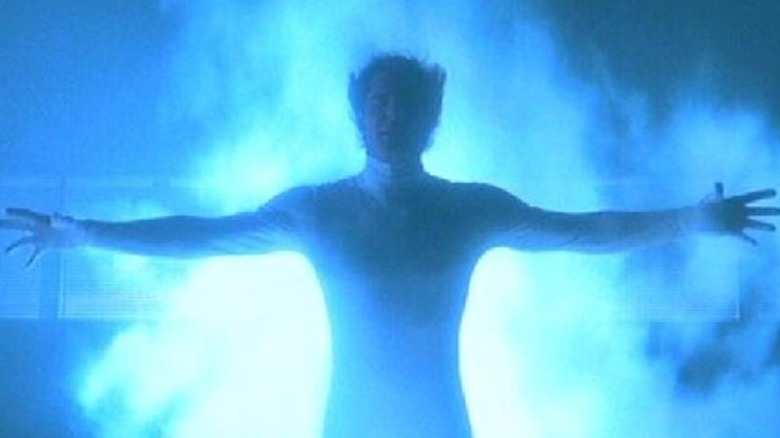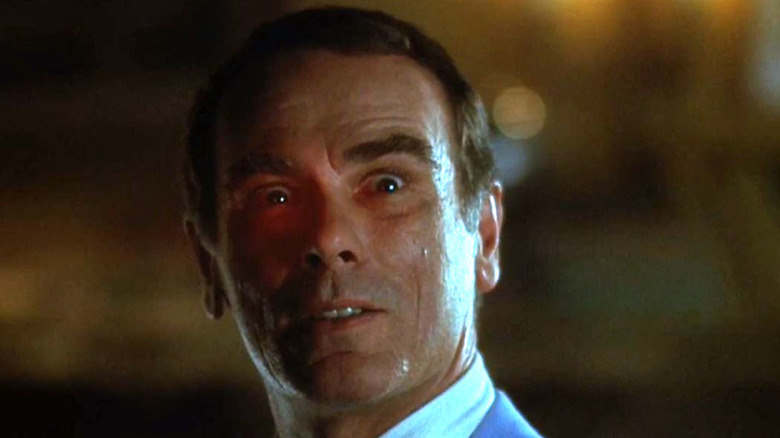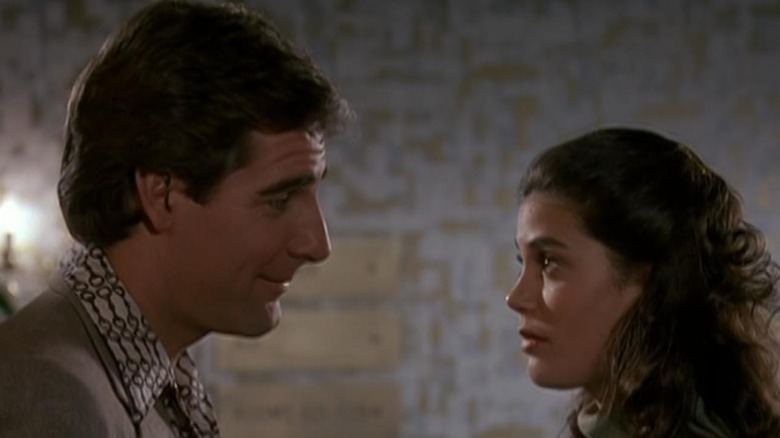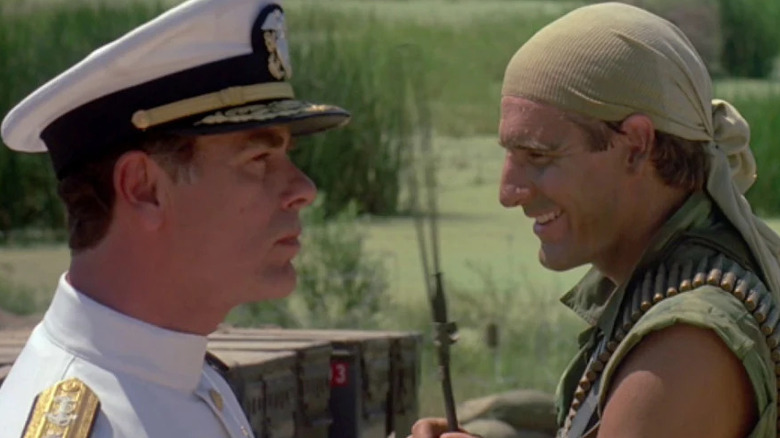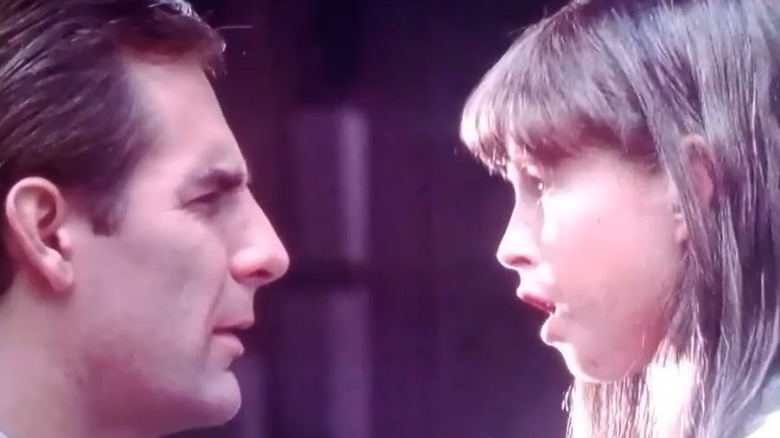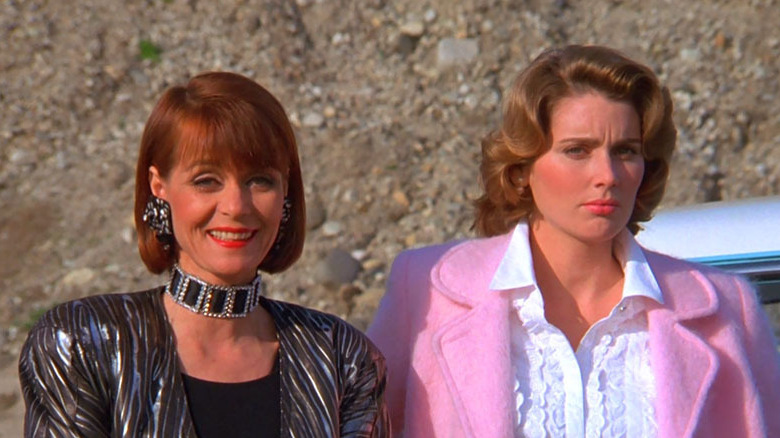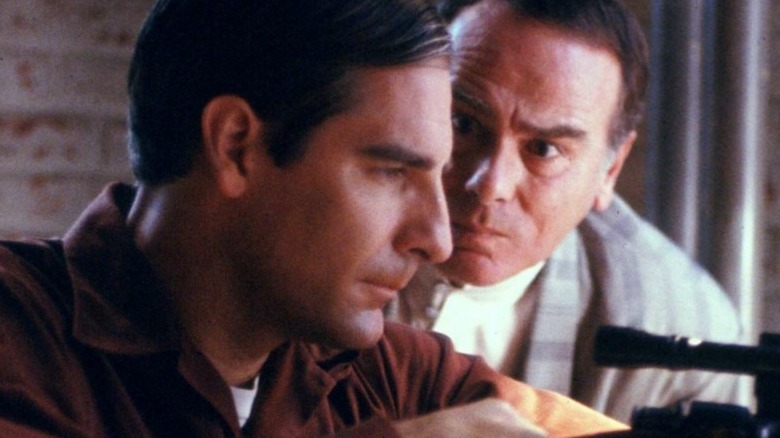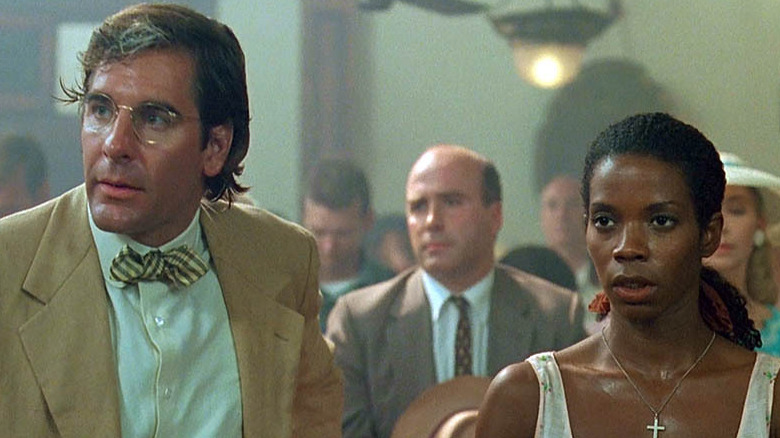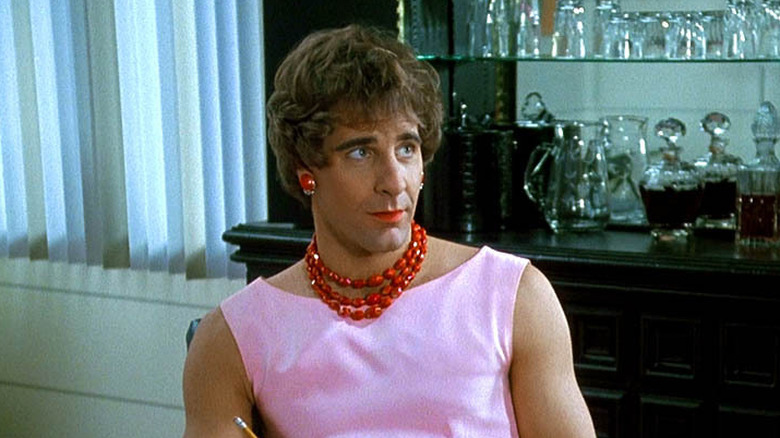The Entire Timeline Of 1989's Quantum Leap Explained
"Theorizing that one could time travel within his own lifetime, Doctor Sam Beckett stepped into the Quantum Leap Accelerator ... and vanished. He awoke to find himself trapped in the past, facing mirror images that were not his own, and driven by an unknown force to change history for the better. His only guide on this journey is Al, an observer from his own time who appears in the form of a hologram that only Sam can see and hear. And so Doctor Beckett finds himself leaping from life to life, striving to put right what once went wrong, and hoping each time that his next leap will be the leap home."
So goes the opening of "Quantum Leap" we're most familiar with, although in truth the show fumbled with a few different ways to convey that crucial knowledge in the early going. It let even the newest or most casual viewer in on the basic internal workings of the show, and it became a great way to impress your geekier friends at parties. However, a successful show requires much more than a captivating intro, and a successful time travel series possibly requires even more as it needs to keep people on the same page as to what the original timeline was, where in it the current episode (leap) is taking place, and what's going on in the hero's present that he's not aware of but may nevertheless be impacting his fate. With the arrival of a "Quantum Leap" reboot, it's a great time to revisit the original series and explain that timeline once and for all.
In the beginning there was Sam
Descended from Civil War veteran Captain John Beckett and Olivia Covington Beckett, Sam Beckett was born on August 8, 1953 to John and Thelma Beckett of Elk Ridge, Indiana, the middle child between older son Tom and younger daughter Katie. He had a wholesome, hardworking upbringing on the family's dairy farm, but was also a child prodigy. He learned to read at two years old, and at four wrote a letter to his favorite TV show, "Captain Galaxy," asking about the title hero's theory of time travel.
Poised to graduate high school at 16, Sam is concerned with girls and basketball and helping out on the farm, but his brother Tom, about to ship out for Vietnam, makes him promise to go to MIT and fulfill the promise of his amazing intellect and abilities. When Tom is killed in action not even five months later, Sam vows to do right by him, and does indeed go to MIT where he gets all the degrees. He becomes a medical doctor, a quantum physicist, and even has a doctorate in music, and while he's highly skilled in all these fields — even performing a piano concerto at Carnegie Hall at age 19 — quantum physics is his true passion. Under the guidance of his professor and mentor Sebastian LoNigro, Sam formulates his string theory, the building block upon which Project Quantum Leap will be founded.
Some time later, Sam is working on the Starbright Project when he meets Donna Elesee and they fall in love. Wedding bells are in the air, but Donna leaves Sam at the altar. Sam walks away with a life partner of a different sort: Al Calavicci, a Navy Admiral who becomes a good friend and joins Sam on Project Quantum Leap.
And there was Al
Al Calavicci was born on June 15, 1934 to a working-class couple in Philadelphia — Italian father, Russian mother, plus a Ukrainian coal miner uncle named Stawpah. A few years later, his little sister Trudy was born into the family, diagnosed with Down syndrome. Their mother found taking care of Trudy to be too much for her, so she split and married someone else. Their father, in turn, struggled mightily to keep his family with him, but ultimately had to take a job overseas, leaving Al in an orphanage and Trudy at a "mental institution," as they were called back then, to care for her special needs.
Although he tried to reconnect with them, Calavicci Sr. developed cancer and died young. Meanwhile, the always resourceful Al learned to box at the orphanage and dabbled in acting too. He ran away for a time and traveled around under the mentorship of pool shark Charlie Walters until he was apprehended and forced to return to the orphanage. At 19, Al went to Trudy's institution to release her into his care, only to find she had died, for which he always blamed the negligence of the staff.
Aimless and angry, Al joined the Navy and quickly became popular with his fellow soldiers. He had an eye for the ladies, too, until he met Beth, whom he married in 1961. A navy pilot, Al flew several assignments and was a member of the Apollo program before starting tours in Vietnam in the mid-'60s. Shortly after his first tour ended, he signed up for his second, eventually being shot down and captured by the Viet Cong in 1967. Beth, alone with her misery because Al had never wanted to relocate children all over the place, lived with the strain for nearly two years before having Al — officially M.I.A. by the Navy — declared dead so she could remarry.
When Al was repatriated in 1973, he took the news hard but stifled his feelings with carefree living and lots of women. Al remarried four more times — never able to make it stick — and had become an angry drunk when he met Sam Beckett on the Starbright Project. Sam's friendship brought a sense of stability back to Al's life, and Al would repay him with undying loyalty.
The Project goes awry
At a secret location in the New Mexico desert, Dr. Sam Beckett is realizing his life's work: Project Quantum Leap. Based on his own String Theory, in which a lifetime, if visualized as a piece of string balled in your fist, can be traversed by leaping from one point to another that touches it, the project is the closest anyone has ever come to achieving time travel. Unfortunately it's very expensive, and with no measurable results, it's under threat of losing its funding. Desperate to prove its worth, Sam steps into the Accelerator Chamber prematurely and is swept into the past. Attempts are made to bring him back, but the Retrieval Program fails and Sam is stuck in 1956, where he has landed for the moment. While the rest of the team scrambles to figure out what went wrong and how to get Dr. Beckett back home, Al enters the Imaging Chamber where, locked onto Sam's neurons, he can appear in Sam's time and place as a hologram.
For his part, the leap has left Sam extremely discombobulated; he can't remember who he is, but he knows the reflection in the mirror is wrong. When he does regain his memory, it's in bits and pieces — a phenomenon Al compares to Swiss cheese because it's full of holes. Luckily Sam seems to remember crucial information when he needs it, such as his medical knowledge, which lends credence to the theory that he has more control over these leaps than he thinks. Nevertheless, no one can seem to figure out how to get Sam back to his present time, and it's only when he corrects some prior wrong that he leaps at all, so Al, artificial intelligence Ziggy, and the team scramble to figure out what Sam's mission is each time, hoping that one of these successful leaps will be enough to bring him home.
Divine intervention?
Early in the series, Sam and Al posit that there's a higher power at work, leaping Sam through history and encouraging him to fix things that went wrong the first time. Why things need to be fixed in a world with a higher power who could've just done things right the first time isn't specified, but it's not the first time people have been asked to accept something on faith. For his part, Sam embraces the notion easily and will frequently address the being, who he assumes is God, whenever circumstances are beyond his abilities.
This goes beyond a casual, throwaway prayer when times are tough, as seen when he asks for rain, and is confronted head on many times, from the clunky "Boogieman" to the charming "It's a Wonderful Leap". And most people assume that the series finale, "Mirror Image," takes place in a sort of spiritual waystation and that the bartender Al (Bruce McGill) is God, explaining the nature of Sam's missions. His conclusion is that Sam is in control of his own destiny and has the ability to go home whenever he feels he's done. According to the title card at the end of the episode, though, he never did. Perhaps, like a member of the clergy, he was called to serve.
Changing history for the better
Although hazy about the logic behind it, since Sam's original hope for Project Quantum Leap was to help people fix events that had gone wrong in their past, as he says in "Mirror Image," he and Al decide this must be the goal of every leap: fix whatever sad fate his host suffered originally, and then Sam can leap to the next. From the very start, in fact, in "Genesis," the computer Ziggy has come to this same conclusion as well, giving it the highest probability for success. The one hard and fast exception to this, however, is changing events in one's own life because that would be an inherently selfish act, going against the entire philosophy of the program. No one involved should manipulate the events of the past for personal gain.
Naturally, this rule is almost immediately abandoned once Sam comes face to face with his past. In only the third episode of the entire series, "Star Crossed," Sam meets his future fiancée Donna (Teri Hatcher) when she's still a young co-ed, around a decade before their paths crossed. Though she isn't the focus of his leap, he ignores Al's objections and figures out a way to accomplish his mission and fix a relationship in Donna's life that may help her be more open to commitment in the future. Perhaps on its own this could still be viewed as selfless, since repairing Donna's relationship with her father far from guarantees she'll go through with a marriage to Sam years later — she may marry someone else entirely or never meet Sam at all. Very soon the gray area dissolves.
Help a brother out
Season 2 is bracketed by Al's requests. In the premiere "Honeymoon Express," Al tries to get Sam to change something significant in history so the project's funding won't be cut off. Sam has his hands full, but unwittingly does change something significant, just like Al wanted, only not in the way he expected. Then things get reckless in the Season 2 finale as Al insists Sam's reason for leaping in "M.I.A." is to stop Navy nurse Beth from remarrying while her husband is missing and presumed dead in Vietnam, when the actual reason is to stop the death of a police officer. Sam discovers Beth was actually Al's wife who lost hope while he was a P.O.W. and is angry at the deception, but immediately upon the start of Season 3, Sam leaps into himself as a teenager and is concerned with nothing but trying to stop his brother from dying in Vietnam and trying to get his dad to stop smoking.
When he goes from Elk Ridge, Indiana in Episode 1 to the middle of the conflict six months later in Episode 2, Sam's even more determined to save Tom, and this time Al helps him, sacrificing his own rescue in the process. It's this act in particular that prompts Sam, in the series finale, to right the wrong he himself committed when he wouldn't do whatever he could to help his friend. They never kept score, but each of them always wanted to give their best to the other, and this improved things for both of them.
Building new relationships
When a timeline is altered in the past, your present can be suddenly different as well. Sam sees the devastating evidence of this in Season 4's "A Leap for Lisa," when, for several terrifying moments, Al's holographic image is replaced by Edward (Roddy McDowall). In most cases, however, the people that are suddenly new to Al and Sam's lives are welcome additions. For instance, Sam is responsible for his mentor Professor LoNigro meeting the woman he eventually marries.
More significantly, Sam gets to spend time with his own previously nonexistent wife in "The Leap Back." Later that season, in "Temptation Eyes," a woman is able to see Sam for himself instead of his host and he's able to have his first genuine connection with someone in years, being granted two full weeks to live a somewhat normal existence. Then, in the "Trilogy" episodes of Season 5, Sam's deep bond with Abigail Fuller (Melora Hardin) results in him — not his host — fathering her child Sammy Jo. Nearly 20 years later, Sammy Jo is working at Project Quantum Leap, no doubt drawn by fate, to try to find a way to bring Dr. Beckett home.
Al gets in on the action too, receiving personalized therapy from Dr. Ruth Westheimer to conquer his fear of intimacy and commitment, then is gifted following Sam's actions in the final episode with a lifelong marriage to Beth and four beloved daughters.
Bad intentions
Despite a rather clunky attempt to address the yin and yang of good versus evil in "The Boogieman," the show returns to the theme in earnest in Season 5 with "Deliver Us From Evil," "Return of the Evil Leaper," and "Revenge of the Evil Leaper."
In this triptych, the notion is explored of someone, somewhere — some WHEN — getting hold of Quantum Leap technology and using it to ruin things for people. And then the details get a little fuzzy. We know that when Sam comes into physical contact with another leaper named Alia (Renee Coleman), they can see each other's true selves. We know that Alia's hologram mentor is Zoey (Carolyn Seymour), their supercomputer is Lothos, and Thames (Hinton Battle) acts as Zoey's hologram when she leaps in search of an escaped Alia. Additionally, we learn from the episodes that Alia's missions — which she is apparently tortured into completing — are centered around destroying people's lives, and Sam encounters her for the first time as she's trying to destroy the lives of the LaMotta family, who Sam has already saved once.
What's never revealed, however, is what this organization is or why it exists. For a time travel show, "Quantum Leap" never really plays with the elasticity of time as much as it could've. So while Sam does bounce around along his timeline, his stories are still experienced in a linear fashion and, ironically, often involve him racing against a clock. Therefore it's not even suggested that Alia et. al. could be saboteurs from Sam's future, hijacking his technology for their own dastardly purposes. If it were, then they would already know who Sam was, where he had been, and could possibly be on the lookout for him, adding even higher stakes to the narrative. Instead, Al lets his superstitious mind take over and states his belief that Alia is Sam's evil counterpart, as if ordained by the gods, much in the same way "The Boogieman" stipulated the existence of the Devil working against Sam's efforts. This explanation is pat but unsatisfying, even with the triumphant end of "Revenge of the Evil Leaper," yet still allows the audience to appreciate Sam as a force of Lawful-Good energy.
Positive results?
For one guy leaping aimlessly through a 30ish-year span of mostly American history, Sam sure comes in contact with a lot of infamous people, places, and events. He's at the Watergate Hotel the night of the break-in. He's a stuntman in the movie "Earthquake." He's smack dab in the middle of the Watts Riots. He's a deputy sheriff in charge of evacuations leading up to Hurricane Camille, one of the worst storms to ever hit the U.S. He's a chimpanzee being used for experiments in the early days of the space program. He's even in the U.S. Civil War. And through brief encounters, he inspires a little bit of the futures of Buddy Holly, Michael Jackson, and Woody Allen in Season 1, Chubby Checker and Dr. Henry Heimlich (of the Maneuver fame) in Season 2, Sylvester Stallone, Stephen King, and Jack Kerouac in Season 3, and Anita Hill in Season 5.
More significantly, Sam leaps directly into the life of pre-fame Elvis Presley, taking credit for writing the song "Baby Let's Play House" as a result. More egregiously, however, Sam leaps into Marilyn Monroe's driver Dennis, who "succeeds" in preventing her death in 1960 so she can star in the film "The Misfits," before her tragic and untimely death in 1962 that we're all familiar with. This was a workaround the writers came up with to allow them to visit touchstone moments in history without having to alter actual events, thereby taking Sam and Al's present timeline outside of the audience's. They also tried this method at the beginning of the season with "Lee Harvey Oswald," claiming that in the original history, Jackie died as well, and Sam's actions prevent that death. It marks the only time the show really experimented with the fluidity of time in this way and the positive response (the two-part episodes rate at 7.4 and 7.6 on IMDb, respectively), suggests that audiences would've been eager to explore these types of scenarios had Season 6 come to fruition.
Fighting the good fight
Over the years and seasons, Sam Beckett goes on many leaps through time, through history, and through the lives of others. Each of these leaps has a great impact on the people closest to the leap targets, as well as on the targets themselves. A lot of times, though, Sam also impacts the cultural mores of the times, advocating equality, diversity, and tolerance. Some of these episodes involve the use of words and phrases no longer deemed acceptable to air, and frequent syndication broadcaster Syfy will edit them out. Some also deal with extremely uncomfortable situations, but in facing that discomfort head-on, the series challenged a lot of outdated societal norms.
There are numerous confrontations with racism — mostly against African Americans, but in "Freedom," also against Indigenous people, and in "The Americanization of Machiko," against the Japanese following WWII. At various points in his leaping lifetime, Sam is faced with segregation in the Jim Crow south, the highly volatile atmosphere of the civil rights era, the Ku Klux Klan, and even conducting escaped slaves along the Underground Railroad. Along the way, he consistently pushes for the people around him to accept those of different skin tones and quite often makes at least some positive inroads, even if it's only with one or two people.
He's an ally
However, race isn't the only topic Sam tackles. He fights safety violations in "Disco Inferno" and "The Wrong Stuff," sexual harassment in "What Price Gloria" and "Dr. Ruth," advocates for the disabled in "Blind Faith," "Jimmy," "Private Dancer," and "Nowhere to Run," takes down the Man in "Good Morning Peoria," "Roberto," and "Promised Land," exposes miscarriages of justice in "So Help Me God" and "Raped" (in which he also deals with the prevalence of domestic violence and the very real, horrific detail that most rapists are never caught, never prosecuted, and never stopped at all), stumps for women's lib in "Runaway" and "Liberation," and supports the LGBTQ community in "Running for Honor" despite Al's obvious unease. On top of all that, he comes across as anti-war — particularly against the Vietnam War — more than half a dozen times.
It's an ambitious, lofty route to take, perfectly fitting with Sam's character while still allowing his humanity to shine through. In this way, "Quantum Leap" really did make life better for the people it touched, because even if only one or two were inspired to take a more tolerant view of the lives around them, their outlooks will inspire others as well, who will inspire others, who will inspire others, and so on, improving our whole world and the world to come.
One last leap for Al
Across all five seasons, all Sam wants is to go home — or so he says. In the series finale, "Mirror Image," Sam finds himself in a bar at the precise moment of his birth. The bar is unlike any normal establishment, though, as the bartender (Bruce McGill) knows far more about Sam and his leaps than anyone should, and Sam himself appears as his own reflection in the mirror.
The bartender — whose name is also Al — explains that Sam has always been in control of his leaps, and that more than anything else what's keeping him from traveling back to his own time is what he considers unfinished business. That is, what does he owe his friend Al? Sam has been saved by Al more times than he can count, and he knows Al has given great sacrifices in order for Sam to get something he needed. So Sam has to leap back to Beth — Al's Beth, in 1969, from "M.I.A." — to let her know that Al's alive, that he's coming home, that he loves her, and not to lose hope.
After filming for the episode wrapped, NBC abruptly canceled the series and "Mirror Image" went from being a season finale to the series finale. A hastily written title card was added following the final scene, letting us know that Sam was successful: Al and Beth were still married and had four daughters. The implication, then, is that he would never meet Sam the way he did, possibly never work on the project at all, and therefore Sam wouldn't be saved one of the many times he needed Al or simply wouldn't have had the same relationship with whomever was in the Imaging Chamber instead. Be it Edward or someone else entirely, it wouldn't be Al, and so Dr. Samuel Beckett never returned home. He could be out there right now, trying to make things better for you, for someone else, or for all of us.
